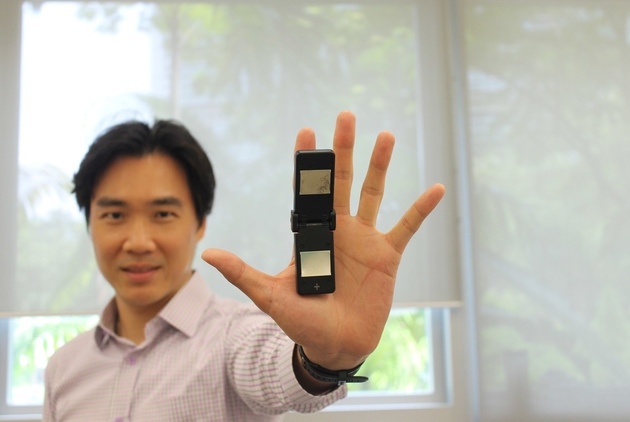Why Are Hong Kong Startups Setting Up Shop In Taiwan?

Source:HK startup AniWear developed the world’s first hand-held electrocardiogram for pets
As protests against the proposed extradition bill continued to heat up in Hong Kong, Taiwan’s largest startup accelerator, AppWorks, noticed a steep rise in the number of applications from Hong Kong, accounting for nearly one out of every three teams.
Views
Why Are Hong Kong Startups Setting Up Shop In Taiwan?
By Elaine Huangweb only
CommonWealth went to Hong Kong to investigate just what kinds of incentives are luring a group of young entrepreneurs with degrees from schools like the University of Hong Kong and the Hong Kong University of Science and Technology to set up shop in Taiwan, rather than the nearby Chinese Greater Bay Area of Guangdong, Hong Kong, and Macao.
Crowds gathered near the Tai Po police station in Hong Kong on August 10, as protests that began on June 9 against a proposed extradition bill continued into a third month. Like a marathon without a finish line, the Hong Kong citizenry’s protests show no signs of cooling off, and the governments of countries like the United States and Japan have issued official travel warnings for Hong Kong.
“At first we asked customers not to come, but they didn’t mind, and came as scheduled,” says Joe Mak, founder and CEO of AniWear, the world’s first AIOT platform for veterinary cardiology, as he busily attends to visiting customers from Japan, Thailand, and Taiwan.
The Hong Kong-born-and-raised Mak, 40, holds a Ph.D in biomedical engineering from the University of Hong Kong and completed two years of postdoctoral research at the New York Department of Health.
Aniwear founder Joe Mak (Source: Elaine Huang)
Mak decided to start AniWear in 2016. An expert at reading biometrics, he dipped his toes in the water of the potential-rich pet market with the world’s first hand-held ECG machine. Dubbed CardioBird, it lets a single veterinarian using a hand-held device run an ECG in 30 seconds, a task that previously took three to four veterinary technicians over an hour to complete.
Hong Kong startup AniWear successfully developed the world’s first hand-held electrocardiogram (ECG) especially for pets. Last year it applied to join Taiwan’s biggest startup accelerator, AppWorks. (Source: Elaine Huang)
Mak targeted veterinarians and clinics, adopting a business model of free hardware installation, charging instead for testing reports.
AniWear’s headquarters is situated in the Sha Tin District of Hong Kong’s New Territories, a vast area created via landfill. The Hong Kong Science and Technology Park planned by the local government lies just two or three stops on the subway away from Tai Po. The district is home to around 700 biotech, green energy, and electronics technology enterprises.
Geographically, the Hong Kong Science and Technology Park is only 30 minutes by car from downtown Shenzhen, China’s high-tech epicenter. Accordingly, the Hong Kong government conceived the science park as a technology research center to hopefully integrate seamlessly with Shenzhen’s tech R&D and market.
Hong Kong Science park (Source: Elaine Huang)
However, Aniwear’s first step outside of Hong Kong was not to meet the 12-million population of Shenzhen or the 110-million population of Guangdong province just 30 minutes away by car, but to Taiwan, 800 kilometers across the sea.
“Business is international, just as the essence of Hong Kong is international,” says Mak.
Headquarters in Hong Kong, Market and Customers in Taiwan
In August 2018 AniWear joined AppWorks, Taiwan’s biggest startup accelerator. After completing the program in six months, Mak continued to lease office space at AppWorks in Taipei’s Xinyi District.
With Shenzhen and China’s vast population and market potential so close by, why did AniWear decide to come to Taiwan?
“Our customers are in Taiwan,” he states frankly.
Aloof from the polarization of politics, Mak embodies Hong Kongers’ characteristic pragmatism. Having just passed the one-hundredth clinic mark, the majority of AniWear’s customers are in Taiwan.
The reasons are simple. Hong Kong got its first university veterinary department this year, and currently has around 160 veterinary clinics, whereas Taiwan has about 10 times as many clinics as Hong Kong. Moreover, one-half of Hong Kong’s vets come from the West, and the other half from Taiwan. Even at veterinary hospitals in the Chinese market, a considerable number of veterinary medical professionals were recruited from Taiwan.
“My customer base is comprised of veterinarians, so of course I set up a base from which to cultivate (customers) directly in Taiwan,” remarks Mak, who currently spends three days each week cultivating the Taiwanese market.
Mak’s case is not an isolated one, as the number of Hong Kong startups coming to Taiwan has grown rapidly in recent years.
The AppWorks accelerator began recruiting and actively cultivating Hong Kong startups four years ago.
For instance, Hong Kong teams joining the program at the end of August account for 32 percent of all the teams. That is, essentially, one of every three teams comes from Hong Kong.
During the same period last year, startup teams hailing from Hong Kong accounted for just 12 percent of attendees.
AppWorks associate Alyssa Chen observes that, among the teams contributing to the steep rise in participation from Hong Kong, “some are obviously coming to Taiwan looking for a market.” Hong Kong startups like AniWear, whose clients are located in Taiwan, naturally set up a base and put together a team here. Of AniWear’s team of 10 members, six serve customers in Taiwan.
In Search of Business Opportunities
“Another key point is user behavior. For instance, e-commerce is mature in Taiwan, and Hong Kong startups come to Taiwan to do e-commerce-related applications,” offers Alyssa Chen.
Hong Kong’s Kwun Tong Station is located on the Kowloon Peninsula. The shared startup space in the building next to the metro station also happens to be where the office of Hong Kong startup EasyChat co-founder Alan Chan is located.
The 35-year-old Chan, a graduate of the Hong Kong University of Science and Technology, founded EasyChat largely as an AI-powered cross-platform messaging automation system for retail businesses. Cross-platform messaging platforms are particularly essential for e-commerce businesses.
EasyChat co-founder Alan Chan (right) and Mobile.Cards regional sales director Jeffrey Lam (left). (Source: Elaine Huang)
“We’ve found that resolving e-commerce messaging issues easily results in [account transfers/lost businesses], so we put messaging software on the e-commerce business’s platform, integrating chat into our platform from enquiries on Facebook, Line, and Whatsapp,” explains Chan.
However, shortly after founding the company in Hong Kong in June of 2017, Chan discovered that e-commerce verticals were few and far between in Hong Kong.
“Four months after our founding, our customers ran storefront platforms, but 70 percent of the business came from Taiwan. We also had registered users from Taiwan, with only 20 percent from Hong Kong, and out of those storefront platform customers in Hong Kong, 70 percent of them came from Taiwan,” says Alan Chan.
Alyssa Chen says that e-commerce accounts for around 20 percent of Taiwan’s retail market, whereas Hong Kong’s proportion is far lower. Compared to such vertical Taiwanese e-commerce outfits as PChome or Lativ, the Taiwanese market is especially mature among those outside of Japan. In comparison, locally grown e-commerce outfits are quite rare in Hong Kong, resulting in the emergence of few added-value e-commerce applications.
The following March, Alan Chan came to Taiwan to establish a base, partnering with 91App over the AppsWork network. The more than 10,000 e-commerce operators on 91App are all customers that EasyChat would like to reach, and Chan directly recruited sales and marketing and software development people in Taiwan in preparation for taking on the Taiwan market.
Getting Started in Taiwan, Expanding into Southeast Asia
“Hong Kong’s market is small, so you have to step outside. The only question is where to go?” asks Jeffrey Lam, regional sales director of Mobile.Cards.
A graduate of Hong Kong University with a business degree, Lam founded a membership app in 2016 in Hong Kong, specializing in helping out small- and medium-sized shops.
With all of Mobile Cards’ 10 engineers in Hong Kong, Lam ventured to Taiwan alone to expand company business, where he noticed the potential need among many of Taiwan’s little shops with young, creative personalities for customized apps. “But the Southeast Asian market can also be reached from Taiwan,” says Lam, who was thinking ahead to the next step.
Nevertheless, Taiwan is not the ultimate market for these Hong Kong startups; rather, extending from Taiwan, they have the expansive Southeast Asian market in mind.
For instance, after Joe Mak set up AppWorks’ base in Taiwan and realized that Taiwan had instituted its New Southbound Policy, he really began to pay attention. The recruitment of startup teams from Southeast Asia by Taiwanese accelerators like AppWorks meant being able to reach the Southeast Asian network right from Taiwan.
Mak was subsequently invited by TechSource, known as “the TechCrunch of Thailand,” to take part in startup events in Thailand. During that time, he made an effort to visit a number of local veterinary clinics in Bangkok.
“I visited with vets in Bangkok, and found my Thai clients,” says Mak with a chuckle.
Have you read?
♦ Southeast Asia Replaces Longtime Favorite China
♦ Southeast Asian Student Enrollment Up 85% in Taiwan
♦ Taiwanese Startups Flock to Pearl River Delta
China or Not China?
However, with the Chinese market so obviously close to Hong Kong, is this the most expedient path to the market for Hong Kong startups?
For example, Hong Kong Chief Executive Carrie Lam has repeatedly stressed during recent public appearances that plans are underway to develop the “hinterland” of the Guangdong-Hong Kong-Macao Greater Bay Area, potentially giving Hong Kong tech startups unprecedented access for the first time to over 100 million consumers. “People used to say Hong Kong’s high-tech startups ‘had seeds but no soil,’ but today this fertile soil is being prepared,” remarked Lam during a mid-year event.
Ming Chan, co-founder and executive director of Hong Kong startup FinMonster, which has forged Asia’s first corporate banking marketplace, flat out states that, “If a product is tied to the China Greater Bay Area concept, venture capital is a lot more interested.”
 FinMonster co-founder Ming Chan (Source: Elaine Huang)
FinMonster co-founder Ming Chan (Source: Elaine Huang)
However, others say it is not that simple.
“Hong Kong startups have heard a lot of American stories over the years, and now over the last few years Chinese stories,” says Joe Mak. However, he believes the China market is not as appealing as outsiders imagine it to be, as China has produced many of its own formidable unicorns. “The market is huge, for sure, but it depends on which piece of the market you can get a share of,” he offers.
For most Hong Kong startups, business is free from the divisive ideology of politics. They are nimble, going wherever opportunity may arise.
“Hong Kong’s past success has come from focusing internationally. That’s Hong Kong’s advantage. Startups must think globally from the very first day or they’ll surely die,” says Mak.
Translated by David Toman
Edited by TC Lin, Sharon Tseng











